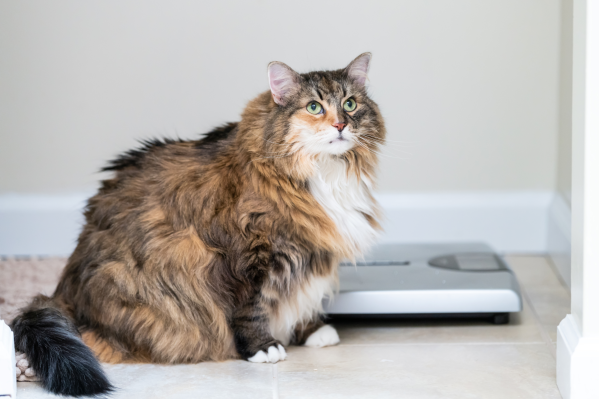Does your feline friend weigh a bit more than is healthy for them? Sometimes it's hard to tell. Especially when it comes to exceptionally furry cats, pet parents might find themselves asking, "Is my cat overweight?"
Ensuring that your cat is a healthy weight is important for their quality of life, as well as their overall health. Studies show that even being moderately overweight lowers a cat’s life expectancy, and obese cats have increased risk for developing certain cancers, heart disease, and osteoarthritis.
Read on to learn how to determine whether your cat is overweight and what you can do to help them lose weight safely.
Is my cat overweight?
If your cat weighs 10-20% over their expected body weight, it can be sign your cat is unhealthfully heavy. However, it’s not enough to say so for sure, because a cat with a lot of muscle mass would weigh more than your average cat but be perfectly healthy.
Perhaps the easiest way for you to figure out if your cat is overweight is to place your hands on their sides and see if you can easily feel their ribcage. You can also check if you can see their waistline when you look down on them from above and refer to the World Small Animal Veterinary Association (WSAVA) condition score to see where your feline family member stacks up.
How to help my cat lose weight
If you can’t easily feel your cat’s ribcage and they look like the images on the right side of the WSAVA chart, you should make an appointment with their vet, who will first make sure there isn’t any underlying medical cause for their obesity. If they suspect this, they may order some bloodwork.
If there isn’t an underlying issue causing your cat to be overweight, there are a few steps you can take to help your cat lose weight.
Diet
You can work with your veterinarian to select the right cat food and daily caloric intake level.
“For cats that are already obese or overweight, a prescription weight loss diet is the most successful and safe method for weight loss,” says Dr. Yui Shapard, who also emphasizes that your cat’s veterinarian can help you choose the correct food based on their health condition, age, activity level, and spay or neuter status.
Wet food can also be a better option for overweight cats, as it has lower levels of carbohydrates than dry kibble, and foods high in carbohydrates can contribute to your cat’s weight gain even if you're feeding them the correct amount. Whatever food you and your vet decide on, make sure that you’re giving them the correct amount to keep them within their daily caloric intake goals.
Exercise
In addition to diet changes, playing with your cat can also help their health and has the side benefit of being fun for both of you.
“Increased play time is a great way for indoor cats to use up their pent up energy,” says Dr. Shapard. “Find out how your cat likes to play and start with a short, fun activity and gradually increase the amount of play time per day. Make sure your cat does not over-exert themself, and if you notice them panting at any point in time, please stop immediately and let them rest. Cats should never be breathing from their mouth, and this is usually a sign of distress.”
If your cat isn’t initially into playtime, keep at it—as they start to lose weight, they’ll have more energy and might become more interested in playing.
As your cat continues their weight loss journey, it’s also important to continue to work with a vet to monitor their progress.
“For any weight loss plan, we do not want our patients to lose more than 2% of body weight per week, so a regular weight check is important for a successful outcome,” says Dr. Shapard.
To that end, if you have the room, it might be worth having a pet scale at home. If not, you can always go into your local vet or animal hospital and use theirs. In either case, you should schedule regular appointments with your vet to check in on your cat and adjust their weight loss plan if needed.
And of course, the experts at Pawp are available 24/7 to address any specific questions or concerns you may have about your cat’s condition, including their weight, lifestyle, and dietary needs.
